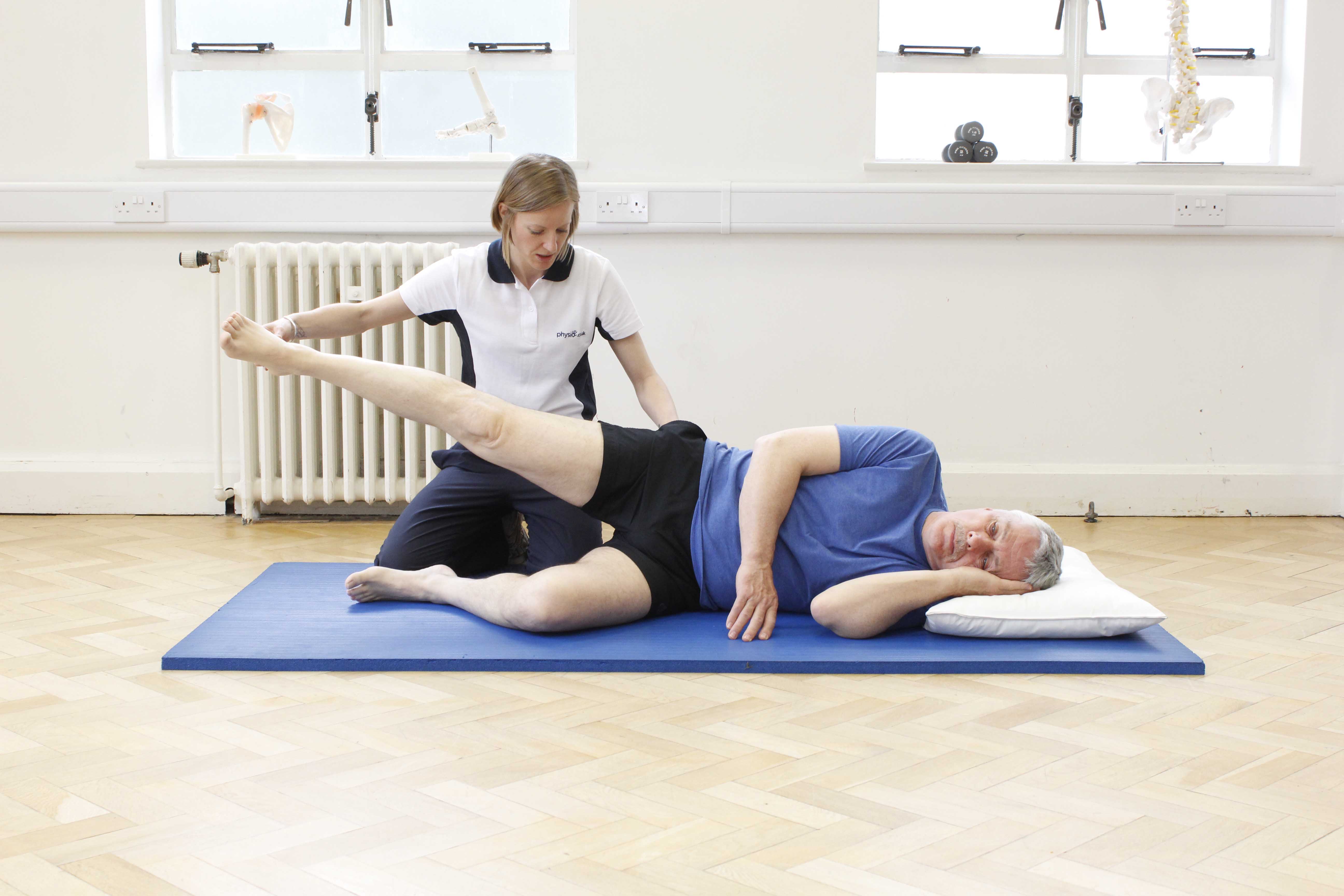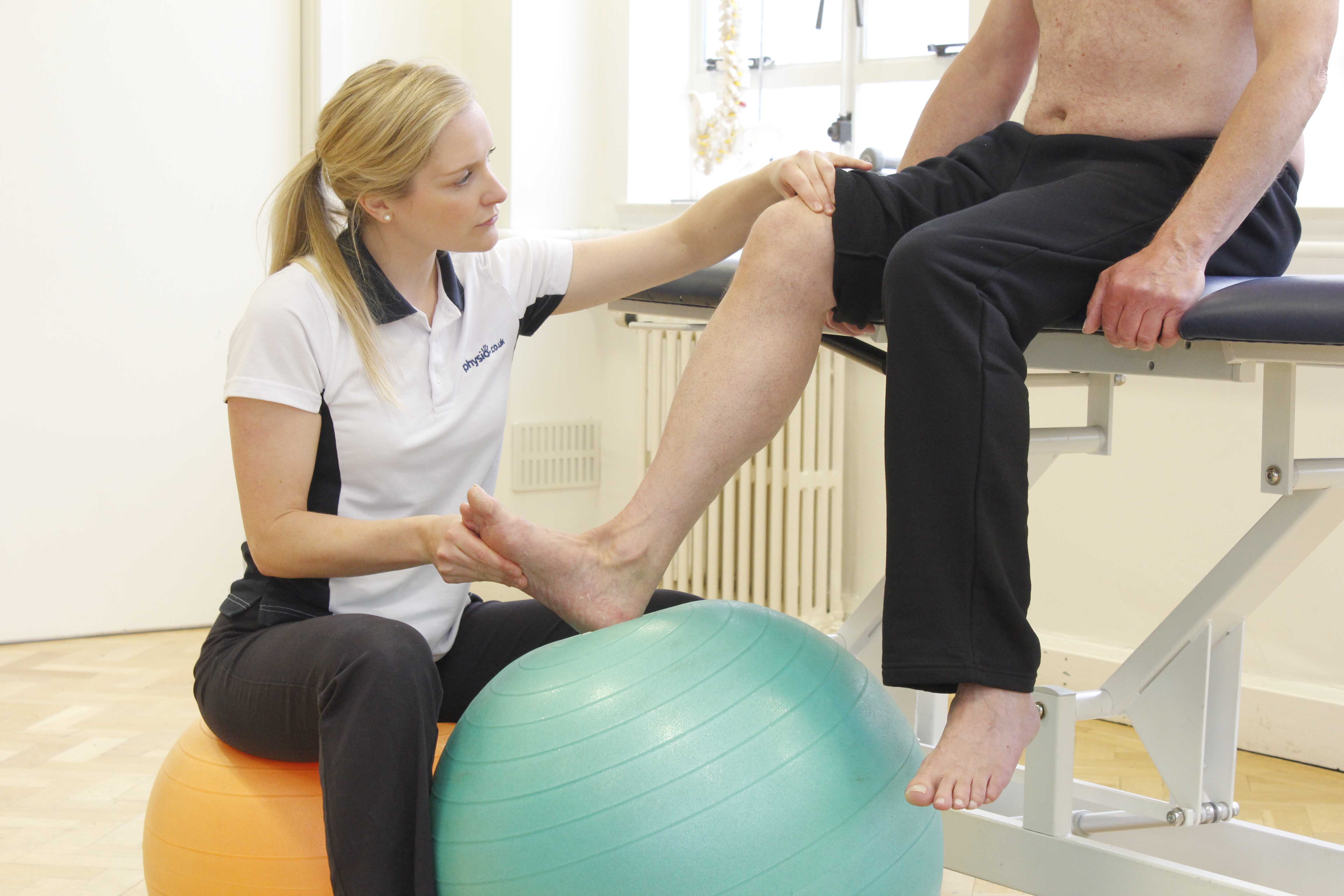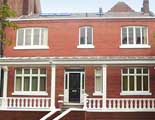What is Guillain-Barré syndrome?
Guillain-Barré syndrome or GBS is an autoimmune disease in which the body's immune system attacks part of the peripheral nervous system causing weakness and abnormal sensations in the arms and legs. Some people will have problems in their facial or respiratory muscles and may require ventilation.
It is a rare condition that usually recovers after a few weeks or months. Guilian-Barre syndrome can occur after a person has had symptoms of a respiratory or gastrointestinal viral infection. Occasionally, surgery or vaccinations will trigger the syndrome. However, it is unclear why it occurs in some people and not in others.
Physiotherapy treatment will promote recovery and help people with Guilian-Barre syndrome keep their work, home and social life as active as possible. Physiotherapy will help people maximise their potential and assist in returning them to a level they were previously.
 Above: Hip abduction exercises supervised by a neurological physiotherapist
Above: Hip abduction exercises supervised by a neurological physiotherapistTypes of Guillain-Barré syndrome
The types of GBS include:
- Acute inflammatory demyelinating polyradiculoneuropathy
(AIDP) - Acute motor axonal neuropathy (AMAN)
- Acute motor sensory axonal neuropathy
- Miller fisher syndrome
- Sensory Guillain-Barré syndrome
Diagnosis of Guillain-Barré syndrome
The doctor will take a detailed clinical history medical examination to confirm a diagnosis of Guillian-Barre syndrome. Your doctor will particularly want to know of any recent possible infections or vaccinations, toxin exposure (such as insecticides or solvents), alcohol intake, tick bites, and family history of nerve disease. Investigations will normally be supported by blood tests, a lumbar puncture and electromyogram (EMG) before a diagnosis of Guillian- Barre syndrome is given.
 Above: ankle mobilisation exercises facilitated by a neurological physiotherapist
Above: ankle mobilisation exercises facilitated by a neurological physiotherapistWhat causes Guillain-Barré syndrome?
Guillian-Barre syndrome is caused by inflammation of the peripheral nerves supplying your muscles, joints and skin. This inflammation prevents the nerves from working properly and slows the conduction of signals travelling along the nerves. The most common explanation for the inflammation is that white blood cells start attacking the nerves.
What are the effects/symptoms of Guillain-Barré syndrome?
Symptoms of Guillain-Barre syndrome include pins and needles, numbness and weakness in the legs and arms. In mores serious cases the bladder, breathing and facial muscles may be affected.
Around 80% of people recover and numbness begins to recede and strength begins to come back.The time taken for recovery to occur is very variable taking weeks, months or even years. Physiotherapy will help speed up recovery.
Some people are however left with severe difficulties that interfere with mobility and everyday tasks. Improvement is fastest during the first few months but people can continue to make improvements even years after the occurrence of Guilian-Barre syndrome.
Physiotherapy for Guillain-Barré syndrome
At Physio.co.uk we understand that Guillian- Barre syndrome is an upsetting disorder because of its sudden and unexpected onset.
A person with Guilian-Barre syndrome will benefit from physiotherapy. Physiotherapy treatment aims to accelerate your recovery and lessen the severity of your condition. Once discharged from hospital a person with Guilian-Barre syndrome can go on to make significant improvements with the help of physiotherapy. Physiotherapy should be started as soon as possible.
Physiotherapy treatment for Guillain-Barré syndrome should start in hospital and continue until you have reached your maximum potential. Physiotherapy for Guillain-Barré syndrome will:
- Increase muscle strength
- Increase mobility
- Increase balance
- Retrain normal patterns of movement
- Increase fitness and energy levels
- Improving posture when sitting, standing and sleeping
- Increased ability to relax
- Minimise secondary complications such as muscle contractures and chest infections.
- Promote recovery
- Teaching exercises to strengthen your muscles using them correctly as often as possible
- Exercises to improve posture and balance in sitting and standing promoting everyday tasks and independence
- Stretching to lengthen tight muscles
- Exercises to increase your stamina and reducing fatigue
- Exercises to enhance functional abilities
- Breathing control and assisted coughing if appropriate to maintain a clear chest
- Hydrotherapy treatment to relax muscles and improve walking

 0330 088 7800
0330 088 7800





































